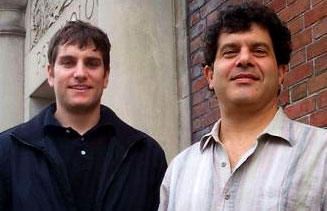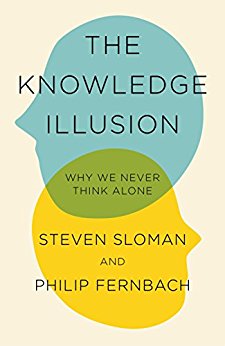In “The Knowledge Illusion” the cognitive scientists Steven Sloman and Philip Fernbach hammer another nail into the coffin of the rational individual. From the 17th century to the 20th century, Western thought depicted individual human beings as independent rational agents, and consequently made these mythical creatures the basis of modern society. Democracy is founded on the idea that the voter knows best, free market capitalism believes the customer is always right, and modern education tries to teach students to think for themselves.
在《知识的错觉》中,认知科学家史蒂文·斯洛曼(Steven Sloman)和菲利普·费尔巴赫(Philip Fernbach)对个体的理性进行了盖棺定论。西方思想从17世纪到20世纪将个体描绘为独立的理性主体,从而使这些神话生物成为现代社会的基础。民主是建立在选民最了解的理念之上的,自由市场资本主义认为,顾客总是正确的,现代教育试图教导学生自己思考。
Over the last few decades, the ideal of the rational individual has been attacked from all sides. Postcolonial and feminist thinkers challenged it as a chauvinistic Western fantasy, glorifying the autonomy and power of white men. Behavioral economists and evolutionary psychologists have demonstrated that most human decisions are based on emotional reactions and heuristic shortcuts rather than rational analysis, and that while our emotions and heuristics were perhaps suitable for dealing with the African savanna in the Stone Age, they are woefully inadequate for dealing with the urban jungle of the silicon age.
在过去的几十年里,理性个体的理想受到各方的攻击。后殖民主义和女性主义思想家锁挑战的是沙文主义的西方幻想,颂扬自治与白人权力。行为经济学家和进化心理学家的研究表明,大多数人做出的决定,是基于情绪反应和启发式的捷径,而不是理性的分析,而我们的情绪和启发可能适用于应付石器时代非洲的热带大草原,却完全不适合应付硅谷时代的都市丛林。
Sloman and Fernbach take this argument further, positing that not just rationality but the very idea of individual thinking is a myth. Humans rarely think for themselves. Rather, we think in groups. Just as it takes a tribe to raise a child, it also takes a tribe to invent a tool, solve a conflict or cure a disease. No individual knows everything it takes to build a cathedral, an atom bomb or an aircraft. What gave Homo sapiens an edge over all other animals and turned us into the masters of the planet was not our individual rationality, but our unparalleled ability to think together in large groups.
Sloman和Fernbach据此进一步提出这个假定的论点,不仅仅是理性,而且个体的思维想法也是一个神话。人类很少考虑到自己,相反,我们在群体中思考。正如原始部落抚养孩子一样,也需要部落发明工具,解决冲突或治愈疾病。没有人知道建造一座大教堂、原子弹或飞机所需要的一切。那些赋予智人超过所有其他动物的优势,并把我们变成了地球的主人的,不是我们的个人理性,而是我们在大团体中无与伦比的共同思考的能力。
As Sloman and Fernbach demonstrate in some of the most interesting and unsettling parts of the book, individual humans know embarrassingly little about the world, and as history progressed, they came to know less and less. A hunter-gatherer in the Stone Age knew how to produce her own clothes, how to start a fire from scratch, how to hunt rabbits and how to escape lions. We today think we know far more, but as individuals we actually know far less. We rely on the expertise of others for almost all our needs. In one humbling experiment, people were asked to evaluate how well they understood how a zipper works. Most people confidently replied that they understood it very well — after all, they use zippers all the time. They were then asked to explain how a zipper works, describing in as much detail as possible all the steps involved in the zipper’s operation. Most had no idea. This is the knowledge illusion. We think we know a lot, even though individually we know very little, because we treat knowledge in the minds of others as if it were our own.
正如Sloman和Fernbach在这本书的最有趣和最令人不安的部分中展示的那样,人类个体对世界的了解如此自少,以至于令人难堪,而且,随着历史的进展,他们知道的越来越少。在石器时代的狩猎者知道如何制作自己的衣服,如何用燧石取火,如何猎取兔子,并至少如何从狮子身边逃生。如今,我们以为我们所知更甚,但是作为个人,实际上我们知道得更少。我们所依靠的他人的专业知识,几乎满足了我们所有的需求。在一个令人相形见绌的实验中,人们被要求评估他们对拉链如何工作的理解。大多数人自信地回答说,他们很了解它,毕竟他们一直在使用拉链。然后要求他们解释:拉链是如何工作的,并尽可能详细地描述拉链在操作中的所有步骤。然而,他们中的大多数对此都摸不着头脑,这就是知识的错觉。我们认为我们知道很多,即使各自都知道很少,因为我们把知识放在了别人的心中,就像是我们自己的一样。
This is not necessarily bad, though. Our reliance on groupthink has made us masters of the world, and the knowledge illusion enables us to go through life without being caught in an impossible effort to understand everything ourselves. From an evolutionary perspective, trusting in the knowledge of others has worked extremely well for humans.
这并不一定是坏的。虽然,我们对群体思维的依赖已经使我们成为世界的主人,同时,知识的错觉能够使我们无需陷入在不可能解自己一切的努力中去经历生活中的一切。从进化的角度来看,信任他人的知识对人类来说是非常好的。
Yet like many other human traits that made sense in past ages but cause trouble in the modern age, the knowledge illusion has its downside. The world is becoming ever more complex, and people fail to realize just how ignorant they are of what’s going on. Consequently some who know next to nothing about meteorology or biology nevertheless conduct fierce debates about climate change and genetically modified crops, while others hold extremely strong views about what should be done in Iraq or Ukraine without being able to locate them on a map. People rarely appreciate their ignorance, because they lock themselves inside an echo chamber of like-minded friends and self-confirming news feeds, where their beliefs are constantly reinforced and seldom challenged.
然而,像许多在过去岁月中其他有意义的,但是在现代会造成麻烦的人类特质,知识的错觉有它的缺点。世界变得越来越复杂,人们没有意识到他们对正在发生的事情有多无知。因此,一些对气象学或生物学一无所知的人仍然对气候变化和转基因作物进行激烈的辩论,而另一些人则对在伊拉克或乌克兰应该做的事情持有非常极端的看法时,却不能够在地图上找到它们。很少有人欣赏他们的无知,因为他们把自己锁在志同道合的朋友和自我确认内容的回音室里,在那里,他们的信仰不断的自我加持并且很少去挑战。
According to Sloman (a professor at Brown and editor of the journal Cognition) and Fernbach (a professor at the University of Colorado’s Leeds School of Business), providing people with more and better information is unlikely to improve matters. Scientists hope to dispel antiscience prejudices by better science education, and pundits hope to sway public opinion on issues like Obamacare or global warming by presenting the public with accurate facts and expert reports. Such hopes are grounded in a misunderstanding of how humans actually think. Most of our views are shaped by communal groupthink rather than individual rationality, and we cling to these views because of group loyalty. Bombarding people with facts and exposing their individual ignorance is likely to backfire. Most people don’t like too many facts, and they certainly don’t like to feel stupid. If you think that you can convince Donald Trump of the truth of global warming by presenting him with the relevant facts — think again.
据Sloman(布朗大学的教授和认知期刊的主编)和Fernbach(在科罗拉多大学的利兹商学院教授)认为,为人们提供更多更好的信息是不可能改善的事项。科学家们希望通过更好的科学教育消除反科学的偏见,专家们希望通过向公众提供准确的事实和专家报告——诸如对奥巴马或全球变暖的问题上——影响公众的舆论,这种希望是建立在对人类如何思考的误解之上的。我们大部分的观点是由公共的集体思考(groupthink也译作团体迷思)而不是个人理性塑造的,我们坚持这些观点,只是因为我们忠于团体。用事实轰炸人,揭露个人的无知,很可能适得其反。大多数人不喜欢过多的事实,他们当然也不喜欢被认为是愚蠢的。如果你认为你可以通过向唐纳德·特朗提供相关的事实来说服他对全球变暖的真相的观点——还是再想想吧。
Indeed, scientists who believe that facts can change public opinion may themselves be the victims of scientific groupthink. The scientific community believes in the efficacy of facts, hence those loyal to that community continue to believe they can win public debates by marshaling the right facts, despite much empirical evidence to the contrary. Similarly, the traditional belief in individual rationality may itself be the product of groupthink rather than of empirical evidence.
In one of the climactic moments of Monty Python’s “Life of Brian,” a huge crowd of starry-eyed followers mistakes Brian for the Messiah. Caught in a corner, Brian tells his disciples: “You don’t need to follow me, you don’t need to follow anybody! You’ve got to think for yourselves! You’re all individuals!” The enthusiastic crowd then chants in unison: “Yes! We’re all individuals!” Monty Python was parodying the counterculture orthodoxy of the 1960s, but the point may be true of the belief in rational individualism in other ages too.
事实上,科学家相信事实可以改变舆论,这本身可能是科学团体迷思的受害者。科学界相信事实是有效性的,因此,那些忠于社区的人继续相信,尽管有相反的经验证据,他们仍然可以通过调配正确的事实来赢得公众的辩论。同样,个人理性的传统信仰本身就可能是团体迷思的产物,而不是实证证据。
在Monty Python的《布莱恩的一生》的高潮时刻中,一大堆不切实际的追随者误认为布莱恩就是弥赛亚。布瑞恩在一个角落里告诉门徒:“你们不需要跟着我,你们不需要跟随任何人!你必须自己思考!你们都是个人!”。狂热的人群齐声说:“是的!我们都是个人!” Monty Python所模仿的是60年代的反主流文化,但是对于其他时代的理性个人主义也是如此。
In the coming decades, the world will probably become far more complex than it is today. Individual humans will consequently know even less about the technological gadgets, the economic currents and the political dynamics that shape the world. How could we then vest authority in voters and customers who are so ignorant and susceptible to manipulation? If Sloman and Fernbach are correct, providing future voters and customers with more and better facts would hardly solve the problem. So what’s the alternative? Sloman and Fernbach don’t have a solution. They suggest a few remedies like offering people simple rules of thumb (“Save 15 percent of your income,” say), educating people on a just-in-time basis (teaching them how to handle unemployment immediately when they are laid off) and encouraging people to be more realistic about their ignorance. This will hardly be enough, of course. True to their own advice, Sloman and Fernbach are well aware of the limits of their own understanding, and they know they don’t know the answer. In all likelihood, nobody knows.
在未来的几十年里,世界可能会变得比今天复杂得多。因此,个体将会对科技的小玩意、经济潮流和塑造世界的政治动力知之更少。那么,我们又怎么才能把选民和客户的权威归功于无知和容易受到操纵呢?如果Sloman和Fernbach是正确的,向未来的选民和客户提供更多更好的事实将难以解决问题。那还有什么办法呢?Sloman和Fernbach都没有解决方案。他们提出了一些补救措施,例如向人们提供一简单的经验法则(“把15%的钱存起来”),对人们进行及时的基本教育(教他们在下岗时如何处理突如其来的失业)并鼓励人们更现实的面对自己的无知。当然,这是远远不够的。就他们自己的建议而言,Sloman和Fernbach很清楚地意识到了他们自己的理解局限,他们知道他们不知道答案。十有八九,没有人知道。
www.psychspace.com心理学空间网


